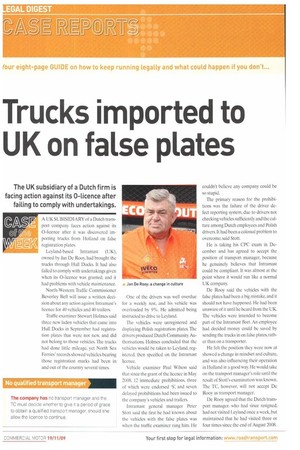Trucks imported to UK on false plates
Page 22

If you've noticed an error in this article please click here to report it so we can fix it.
The UK subsidiary of a Dutch firm is facing action against its 0-licence after failing to comply with undertakings.
A UK SUBISIDIARY of a Dutch transport company faces action against its 0-licence after it was discovered importing trucks from Holland on false registration plates.
Leyland-based Intramast (UK), owned by Jan De Rooy, had brought the trucks through Hull Docks. It had also failed to comply with undertakings given when its 0-licence was granted. and it had problems with vehicle maintenance.
North-Western Traffic Commissioner Beverley Bell will issue a written decision about any action against Intramast's licence for 40 vehicles and 40 trailers.
Traffic examiner Stewart Holmes said three new laden vehicles that came into Hull Docks in September had registration plates that were not new, and did not belong to those vehicles. The trucks had done little mileage, yet North Sea Ferries' records showed vehicles bearing those registration marks had been in and out of the country several times. One of the drivers was well overdue for a weekly rest, and his vehicle was overloaded by 9%. He admitted being instructed to drive to Leyland.
The vehicles were unregistered and displaying Polish registration plates. The drivers produced Dutch Community Authorisations. Holmes concluded that the vehicles would be taken to Leyland, registered, then specified on the Intrarnast licence.
Vehicle examiner Paul Wilson said that since the grant of the licence in May 2008. 12 immediate prohibitions, three of which were endorsed 'S', and seven delayed prohibitions had been issued to the company's vehicles and trailers.
Intramast general manager Peter Stott said the first he had known about the vehicles with the false plates was when the traffic examiner rang him. He couldn't believe any company could be so stupid.
The primary reason for the prohibitions was the failure of the driver defect reporting system, due to drivers not checking vehicles sufficiently and the culture among Dutch employees and Polish drivers. It had been a colossal problem to overcome. said Stott.
He is taking his CPC exam in December and has agreed to accept the position of transport manager, because he genuinely believes that tntramast could be compliant. It was almost at the point where it would run like a normal UK company.
De Rooy said the vehicles with the false plates had been a big mistake, and it should not have happened. He had been unaware of it until he heard from the UK. The vehicles were intended to become part of the Intramast fleet. An employee had decided money could be saved by sending the trucks in on false plates, rather than on a transporter.
He felt the position they were now at showed a change in mindset and culture, and was also influencing their operation in Holland in a good way. He would take on the transport manager's role until the result of Stott's examination was known. The TC, however, will not accept De Rooy as transport manager.
De Rooy agreed that the Dutch transport manager. who had since resigned, had not visited Leyland once a week, but maintained that he had visited three or four times since the end of August 2008.
















































































































































